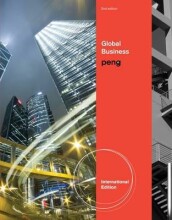Starting international business
22 important questions on Starting international business
What is an entrepreneurial team?
What is sporadic (passive) exporting?
What is the difference between a sales agent and a distributor?
- Higher grades + faster learning
- Never study anything twice
- 100% sure, 100% understanding
What are the 2 different forms of trade in services?
2. Servicing foreign visitors
What is servicing foreign visitors?
What are the 5 most common form of international contractual relationships?
2. Franchising
3. Turnkey and build-own-operate projects
4. Subcontracting
5. Management contracts
What are the advantages and disadvantages of R&D contracts?
- uncertain nature of R&D make negotiating contracts hard
- contracts may nurture competitors
- firms that rely on outsiders to perform R&D may lose some of their core R&D capabilities
What is experiential knowledge?
What are the 3 internationalisation process models?
2. Network internationalisation model
3. Stages model of internationalisation
What is the Uppsala model?
What are stage models?
What is a born global (International New Venture)?
In what ways do INVs build their resources and capabilities?
2. Cooperating with internationally active firms
3. Learning from others
4. Acquiring resources abroad
What is mimetic behaviour?
Why do firms go global according to Rugman and Verbeke?
What are the sources of temporary competitive advantage?
1. Valuable
2. Rare
3. Not difficult to imitate
4. Supported by the organisation
What are the ownership advantages?
2. Sharing of resources across business units
3. Capabilities arising from combining business units in multiple countries
4. Capabilities arising from organisational structures and culture
What are the forms of asset specificity?
2. Site specificity - investments in productive assets are made in close proximity to each other
3. Human asset specificity - accumulation of knowledge that is specific to one trading partner
4. Dedicated assets - investments in general capital to meet demand of specific buyer
Why do global firms exist?
2. located in countries with small domestic markets
3. Offer products that complement products of other MNEs, take advantage of global IT infrastructure or tap into demand for product that is somewhat uniform across national geographic markets
What are the advantages and disadvantages of subsidies?
- when used to protect uncompetitive businesses, subsidies lead to inefficient allocation of resources
What are the characteristics of doing business in common law countries?
2. Business contracts should include provisions for all imaginable risks
3. Assistance of competent lawyers is essential
What are the downsides of the single market for businesses?
2. Difficult for companies in poorer countries to compete with rivals in richer countries
The question on the page originate from the summary of the following study material:
- A unique study and practice tool
- Never study anything twice again
- Get the grades you hope for
- 100% sure, 100% understanding
































